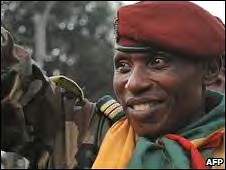
Guinean Captain Moussa Dadis Camara has become the leader of the government after a coup by junior army officers in this West African state.
Originally uploaded by Pan-African News Wire File Photos
Tuesday 30 December 2008
The National Council for Democracy and Development of Guinea, which seized power after the death of President Lansana Conte last week, has appointed banker Kabine Komara as the new civilian prime minister.
AFP - Banker Kabine Komara, who was named prime minister by the military junta which seized power in Guinea last week, is an accomplished technocrat but a newcomer on the country's political scene.
Komara was working in Cairo as a senior director of the African Export-Import Bank when the announcement came.
Noted for his competence and background knowledge Komara graduated from the elite academy Ecole superieure d'administration in Conakry, got degrees from the University of Colorado in the United States and the American University in Cairo and holds an MBA from the Ecole superieure de commerce at Rennes, France.
Born in 1950 Komara started his career in the 1970s working for Guinea's central bank under Ahmed Sekou Toure (1958-1984), Guinea's leader turned dictator.
In 1975 Komara crossed over to work in the private sector when he took a job at the Friguia company which produces aluminium in Fria near Conakry. Guinea is a leading bauxite exporter, a mineral used to make aluminium.
After a two-year stint working as the deputy director of the personnel department of the Guinean Bauxite company CBG he returned to work for the government in 1986 at the planning ministry following the 1984 coup by the late president Lansana Conte.
In the 1990s he continued to work for the finance and planning ministry in Guinea serving as a liaison between the government and the African Development Bank.
In 1995 Komara left Guinea to take a job at the African Export-Import Bank based in Cairo. The Afrimexbank was created to stimulate inter-African trade.
As prime minister of Guinea the former banker has his work cut out for him.
Despite the country's vast mineral wealth more than half of the population live below the poverty line, corruption is widespread and social tensions boil beneath the surface.
Guinea: President Sirleaf Holds Talks With Senior Members of New Military Leadership in Neighbouring Guinea
30 December 2008
Monrovia — A meeting has taken place in Monrovia between President Ellen Johnson Sirleaf and a senior official of the new military leadership in neighboring Guinea, the 2nd Vice President General Mamadou Bah Camara.
During talks at the President's Foreign Ministry office, the Guinean military official informed President Sirleaf that the military seized power to fill the leadership vacuum created following the death of the country's leader, General Lansana Conte. He explained that the constitutional term for the Guinean parliament had expired.
An Executive Mansion release quotes General Bah as saying he was visiting Liberia to explain the rationale behind the military takeover and solicit Liberia's support for the events in his country. Guinea's second man in command maintained that the new leadership remains committed to the restoration of democratic civilian rule in his country. The General lauded President Johnson Sirleaf for granting his delegation the opportunity to present its case.
Responding President Johnson Sirleaf, who also chairs the Mano River Union sub-regional grouping, spoke of the close ties between Guinea and Liberia. Whatever happens in Guinea or any of the neighboring countries, the President said also affects Liberia. She spoke of the tremendous sacrifices made by African countries in restoring peace to Liberia and said Liberia was prepared to provide the moral support for the efforts they made towards peace in the country.
On the return of Guinea to democratic civilian rule in two years, the President said the leadership had informed her that the two-year transition period set aside by the new authorities was the maximum time frame, but noted, however, that there could be a transition before the expiration of the two years the Council has announced.
The Liberian leader reiterated that the position of the Mano River Union regarding events in neighboring Guinea would be guarded by consultations currently being held within the framework of the Economic Community of West African States (ECOWAS).
"We are all one people, we have to work together for the common good of our people," the Liberian leader later told a meeting of Liberian and Guinean officials at the Foreign Ministry.
Accompanied by a special envoy of Senegalese President Abdoulaye Wade, the Guinean delegation arrived in the country late Tuesday afternoon following a visit to Bamako in Mali. The 35-member delegation which comprised 6-council members of the new military authorities departed Liberia Tuesday night for neighboring Sierra Leone.
No comments:
Post a Comment